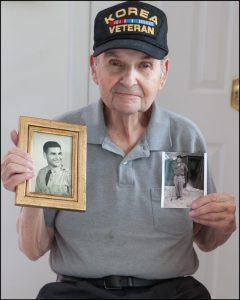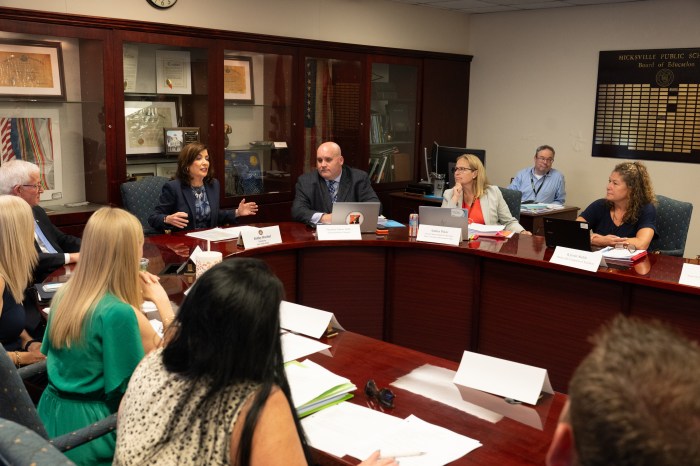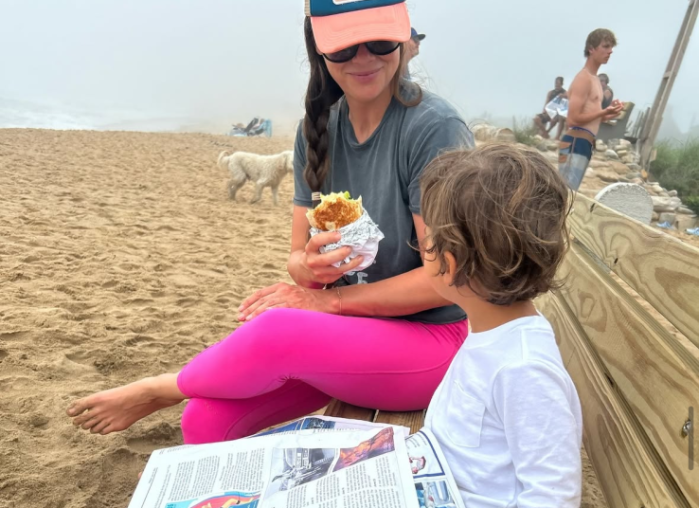
(Photo by Dave Paone)
In the fall of 1952, Bernie Hoffman was a 20-year-old, private first class on the front lines in Korea. By this time in the war the Chinese Communist Forces were supporting the North Koreans and Hoffman was in combat with both.
Hoffman, in the Seventh Infantry Division, 31st Infantry Regiment, Heavy Weapons Company H, served in Korea for a total of 13 months, which included an entire, brutal winter. He spent it in a field, where he slept in a sleeping bag on the ground, without a tent, sometimes waking up covered in snow. On one occasion it was six inches worth.
The soldiers had none of the comforts of home. Their bathroom (or latrine, in army parlance) “was a hole in the ground and a piece of wood on top,” said Hoffman. As for bathing, “We used to go to a shower point every week or two,” he said.
“My biggest fear was getting killed,” said Hoffman. “A bigger fear—coming back missing an arm [or] a leg. If it was a choice of being killed or being maimed, I’d rather be killed.”
On June 25, 1950, the North Korean army crossed the 38th parallel (the line on a map that separates North and South Korea) and invaded its neighbor. Three days later, North Korean forces captured Seoul, the capital of South Korea. On June 27, the United Nations Security Council asked member states to come to South Korea’s assistance and July 1, the first U.S. ground-combat troops answered the call and arrived in Korea. For the U.S., the Korean War had begun.
Hoffman was born on June 4, 1932, in the Brownsville section of Brooklyn and graduated high school in 1950. That made him the prime age for the draft. However, he was able to get a deferment by attending college and did so by enrolling as a business major at the Brooklyn campus of Long Island University.
But by his second year, Hoffman had become disenchanted with the school. Both LIU and City College of New York had been caught in a college basketball, point-shaving scandal and Hoffman didn’t want to be associated with such an institution, for fear it would hurt his career down the line. So he dropped out, knowing full well he’d get drafted.
In the mean time, his friends who had joined the military were all serving in Germany, so Hoffman assumed he’d have the same fate. He didn’t.
After basic training at Fort Indiantown Gap near Harrisburg, PA, he was sent to Japan and was trained to be a medic at the Japanese Naval Academy in Eta Jima. His plans changed again and he wound up in the infantry, in enemy territory in Korea.
Although Hoffman and his company endured atrocious living conditions, they got luckier when it came to meals.
“We had the two best cooks in the U.S. Army,” said Hoffman. One of them, named Pappas, had a father who owned a Greek restaurant in Boston. “I gained weight in Korea because the food was so good.”
On July 27, 1953, representatives of the United Nations and North Korea signed an armistice at Panmunjom, just north of the 38th parallel. However, a permanent peace treaty was never signed, so technically, the U.S. has been at war with North Korea for just shy of 68 years.
President Trump is looking to end the war as well as ease tensions between North Korea and the U.S., which have been steadily mounting for the past 30 years. A summit between Trump and his North Korean counterpart, Kim Jong-un, was scheduled for June 12 in Singapore.
When North Korea was testing nuclear missiles recently, Hoffman thought another Korean War could be a reality. “I think we were very close,” said Hoffman. But he feels China’s pressure and Trump’s sanctions are keeping Kim in line.
After the war, Hoffman attended City College at night and received his degree in business. He married his wife, Florence, in 1955. They met by chance on Brighton Beach in Brooklyn.
“If I didn’t go to the beach that day, I’d still be single,” he said.
They had met before the war and exchanged letters while Hoffman was in Korea.
Hoffman worked in sales and moved to Merrick in 1961. He has two daughters and seven grandchildren.
Hoffman is a member of the Veterans of Foreign Wars, the Jewish War Veterans, the American Legion and the Korean War Veterans. He receives a newsletter that updates him about the other soldiers in his regiment. Florence is currently president of the American Legion Auxiliary Unit in Merrick.
About five years ago, Hoffman returned to Korea with a group of veterans. They went to the Demilitarized Zone, the neutral area between North and South Korea, at the 38th parallel.
“South Korean people really appreciate what we did for them,” Hoffman said. “And the Korean people here appreciate [it, too].”
Hoffman added, “I don’t believe in war. I lived through World War II, Korean War, Vietnamese War, there’s killing going on now in the Middle East and there should be a better way…We should be helping each other and not killing.”
“It’s hard for me to believe it was 65 years ago that the war ended,” Hoffman said. “I don’t know where the years went.”
By Dave Paone



























